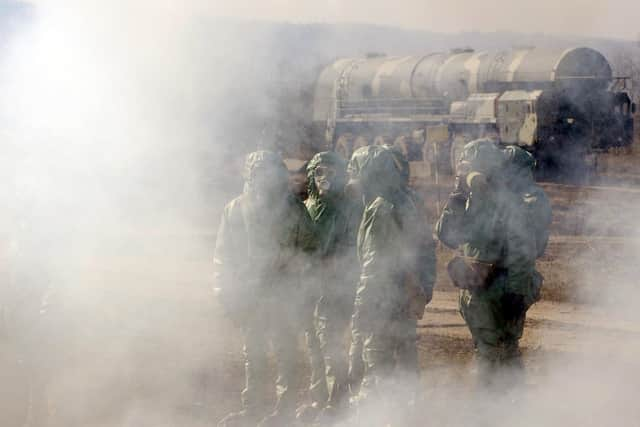Russia's war on Ukraine: Talk of Vladimir Putin using nuclear weapons is scaremongering – Lt Col Stuart Crawford
Indeed, a recent article in one of the London-centric broadsheets has suggested that “Britain should prepare for a nuclear war”. On the radio and television, assorted prophets of doom have been plying their trade, warning of the end of the world.
So, is Europe looking into the abyss on nuclear Armageddon? The short answer is probably not.
Advertisement
Hide AdAdvertisement
Hide AdBut first let’s make the distinction between strategic nuclear weapons and tactical ones clear.
Strategic nukes, like the Trident D5 missiles carried on the UK’s nuclear deterrent submarines based at Faslane, have a huge explosive potential, many times that of those bombs dropped by the US on Japan at the end of the Second World War. Tactical nukes have a much lower yield, although still powerful, and are designed to have effect on the battlefield when conventional weaponry has not achieved the desired results.
The key difference, however, is how they might be utilised. Strategic weapons are designed to strike using overwhelming destruction as part of a grand strategy.
This was the historical nuclear fear during the Cold War – a nuclear exchange between the USA and its nuclear-armed Nato allies, the UK and France, and the Soviet Union/Russia.
And to a certain extent this fear persists today, although nothing like it did during the 1960s. Who living at the time can forget the government advice that, in the event of your granny dying of radiation poisoning, you should wrap her body in a plastic bag and put her outside the front door?


Tactical nuclear weapons, on the other hand, are designed to be used as part of a battlefield plan in conjunction with all the other weaponry available to modern armies. That doesn’t mean that their effects are not devastating.
Some types have a variable yield, which allows their destructive power can be calibrated for a specific attack and avoid some aspects of the inevitable collateral damage axiomatic in such attacks.
The numbers of tactical nuclear weapons held by both sides of the ideological divide are hard to gauge accurately, but it would appear that Russia might be able to field some 2,000 plus which could be fired by the likes of the Iskander missile system (known to Nato as the SS-26) which is present in Ukraine. Whether the nuclear warheads are also there is unknown.
Advertisement
Hide AdAdvertisement
Hide AdThe US for its part has probably fewer that 250, with some 100 deployed in Europe and the rest in storage.
The main problem is that any use of nuclear weapons whether strategic or tactical will inevitably lead to an escalation of the conflict. In the case of Russian operations in Ukraine, their use would lead almost certainly to intervention by Nato and a direct confrontation between the USA and Russia. There is little doubt that Russia would lose this contest, and lose it badly. Putin knows this and will want to avoid that scenario at all costs.
The only circumstance that I can see in which Putin might authorise the use of tactical nukes is in the face of an existential threat to the very existence of Russia.
The present conflict does not represent that as long as it is generally confined within the borders of Ukraine. No Ukrainian politician is calling for a general attack on Russian territory, and territorial demands are restricted to the handing back of Russian-occupied territory including the Donbas and Crimea.
Where we do have to be careful, though, is around the current state of play at Europe’s largest nuclear power station at Zaporizhzhia. Captured by the Russians at the beginning of the conflict, it now appears that the invaders are trying to maintain it in operation to divert the electricity it produces to Russia, and it has been reported that the Ukrainian workers who continue to operate it are being held there at gunpoint.
More worrying, though, is that the Russian army may be using the power station as a sort of “nuclear shield”, both to shelter military equipment there and also to launch artillery strikes on their enemy.
The Ukrainians find it hard to retaliate in the circumstances, and memories of the Chernobyl disaster are still fresh in the collective psyche. And yet accusations are still made by both sides of artillery attacks and false flag operations in this dangerous area. There is a real fear of leaks of nuclear radiation.
This aside, though, there is no current, clear, existential threat to the Russian state and that is why I think it is extremely unlikely that they will employ tactical nuclear weapons in the current confrontation.
Advertisement
Hide AdAdvertisement
Hide AdEven some Russians agree; recently in a German media outlet Russian defence and armaments expert, Ruslan Pukhov, made it clear that the nuclear option being repeatedly trailed by the Kremlin is no more than a threatening gesture, mere sabre-rattling in the face of perceived military failures.
I think this is absolutely correct, and at the present time and in the current circumstances the probability of the Russians using tactical nuclear weapons in Ukraine are close to zero.
You can never say never, though, and matters need to be closely monitored just in case. It’s just possible that Putin, facing defeat and humiliation, could choose to go out in a blaze of glory. One can only hope that those around him would be sensible enough to stay his hand.
But all of this is highly unlikely and I think we can all sleep safe in our beds. In the meantime, those predicting otherwise are merely scaremongering and need to stop.
Stuart Crawford, a former Lieutenant Colonel in the Royal Tank Regiment, is a defence and military commentator
Comments
Want to join the conversation? Please or to comment on this article.
